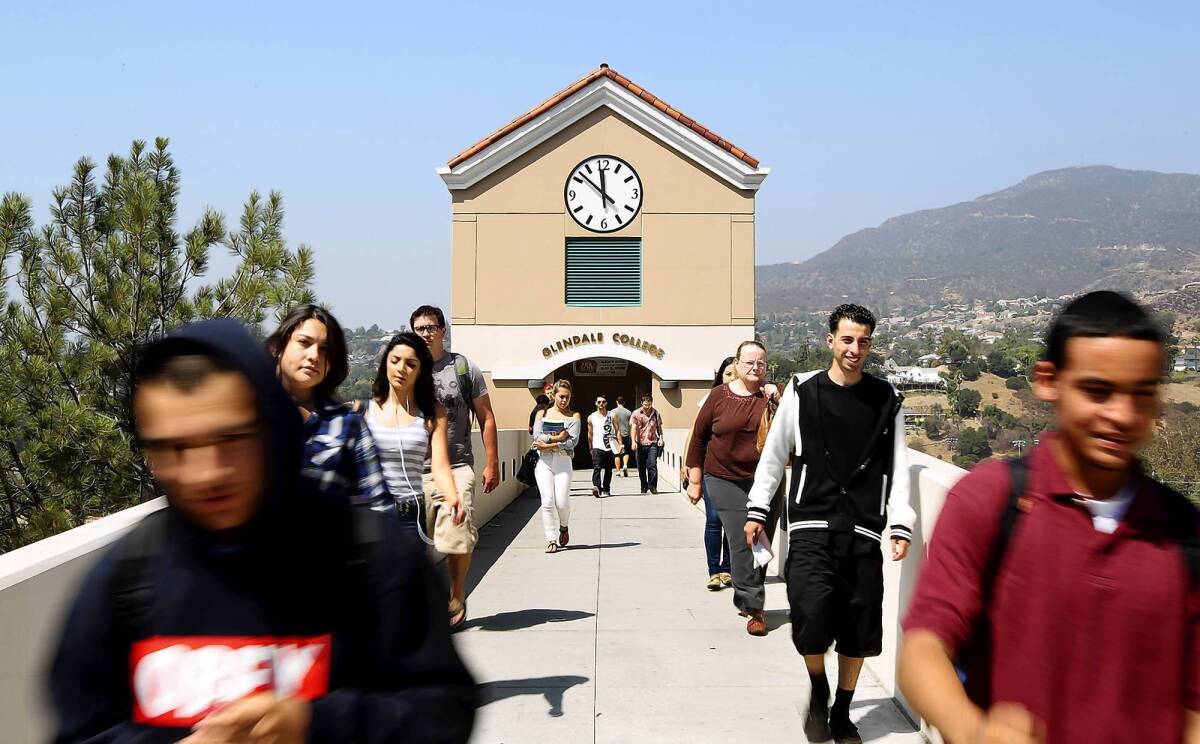Passage of Prop. 30 hailed by educators

- Share via
With the passage of Proposition 30, college students will be spared another round of tuition increases and younger students will avoid a shorter school year, results that were met with much jubilation Wednesday.
For public school districts, the measure’s success was mostly about escaping another wave of severe budget cuts, including teacher layoffs, curtailed instructional time and larger classes. But for higher education, the measure is expected to reap immediate positive benefits.
California’s community college system will restore thousands of classes, somewhat easing a huge backlog of students unable to complete their degrees. Cal State students can look forward to modest tuition refunds. And annual tuition spikes at the University of California are on hold for now.
Community colleges will receive about $210 million in additional funding and serve about 20,000 more students, new Chancellor Brice W. Harris said at a Wednesday media briefing.
Financial prospects going forward also look better, he said, after several years of reductions to programs and class offerings — paired with fee increases. The system has turned away half a million students that it would have served in more prosperous times.
“I’m guardedly optimistic that we’re beginning to find the bottom in California,” Harris said.
The nine-campus L.A. Community College District avoided a cut of $30 million and instead will add about 200 classes this spring, said Chancellor Daniel LaVista. And Pasadena City College will receive a boost of about $6.7 million to restore classes and other student services, officials said.
Student interest in the election — and the increasing ease with which they could register to vote, including online — were powerful elements statewide for Proposition 30, said Raphael Sonenshein, who heads the Pat Brown Institute of Public Affairs at Cal State L.A.
Students registered about 3,000 of their Los Angeles Community College District peers in the four weeks leading up to the election, said Herlim Li, 35, a political-science major and organizer who attends both East L.A. College and Cal State L.A.
The ballot measure won with 54% of California voters — nearly 60% in L.A. County.
The California State University system will reverse a $249 per semester tuition increase that took effect this fall. Tuition for undergraduates will return to last year’s rate of $5,472. Students will be credited, refunded or receive a reconfigured financial aid package, officials said.
“We are hopeful that the passage of Proposition 30 will be the beginning of the state’s reinvestment in higher education,” Cal State Chancellor Charles B. Reed said in a statement. “The state needs to start making up for the devastating budget cuts of the past several years.”
The system had wait-listed most applicants for fall 2013 pending the outcome of Proposition 30, but will now restart the admissions review process.
Students in the University of California system dodged a threatened 20% tuition increase — about $2,400 — that would probably have gone into effect next month. UC Regents Chairwoman Sherry Lansing said the measure’s success “will certainly help us in our battle to restore fiscal stability to the University of California.”
UC regents, however, are scheduled to vote next week on raising 2013-14 supplemental fees for graduate and professional programs such as nursing, business, social work, dentistry, medicine and architecture. Those increases could range between 1.2% and 35%, with most fees rising 7% or less.
And undergraduate tuition increases for next year remain a possibility.
In Los Angeles Unified, the good news of Proposition 30 instantly became a new source of contention. Teachers union President Warren Fletcher on Wednesday said he “expected” the nation’s second-largest K-12 system to restore 10 days of pay that teachers had surrendered — as well as a full 180-day school year for students.
Schools Supt. John Deasy said he hoped the district could salvage three of five instructional days lost to previous budget cuts; it remained unclear when those days might be scheduled. And, teachers and other employees would receive lost pay only when a canceled school day is restored.
He said he was grateful to have avoided such fallback cuts as eliminating all Advanced Placement classes, all home-to-school transportation and three additional weeks of school.
San Diego Unified Supt. Bill Kowba said his district had been prepared to pare the school year by at least 14 days. In recent years, the district eliminated about 2,000 jobs and made hundreds of millions of dollars in budget cuts.
Kowba said he felt “an incredible sigh of relief and complete debt of gratitude to the voters.”
The measure’s failure would have further devastated Inglewood Unified. In September, the district received a $55-million emergency loan to avoid bankruptcy.
If Proposition 30 had lost “it would have taken us out,” said Kent Taylor, the district’s state-appointed administrator. “There’s no way we would have been able to recover.”
Times staff writers Stephen Ceasar and Larry Gordon contributed to this report.
More to Read
Sign up for Essential California
The most important California stories and recommendations in your inbox every morning.
You may occasionally receive promotional content from the Los Angeles Times.












